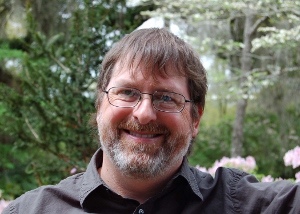
Fourteen Questions/Musings Provoked by Austin Allen’s “Where He Is”
Contributor’s Marginalia: Dan Albergotti on “Where He Is” by Austin Allen
What if hell is a studio in Burbank?
What if someone invents a mechanism to measure weeping levels? Think of the practical applications, of the vials—the vats!—of tears kept on file in cavernous research labs, of the value as a physical polling device. The tears could be used to measure despair in fluid ounces over the outcomes of football games, of presidential debates, of lives.
Can you really own a time slot or a studio lot? Even if you can, how long will you be able to hold on before the inevitable end, before the Nielsen Ratings or property values tank?
What if paradise is a studio in Burbank? Just imagine Saint Peter at the Pearly Gates, delivering yet another five-minute monologue to an audience of the heavenly host before welcoming the next guest, before each freshly dead soul arrives.
Surely the leisure suit is proof that Satan exists and sometimes walks among us. In the mid-seventies, he strutted onto stage with a cigarette and a smile, and we thought he looked fine.
Set up a disarming prairie boy behind a desk raised a little higher than a chair and sofa to his right. Put the stars in the chair, let them chat a bit, and then kick them to the sofa. That should make us all feel a little better about our lot each night.
Don’t you hate it when you dream the dead back alive and then wake to find them gone again? Mary Shelley had a dream like that about her dead child: back in her arms in the dream, back in the ground when she woke. Then she wrote Frankenstein.
Lost friends can’t really be restored, right?
What if purgatory is a studio in Burbank? Imagine the green room packed, more crowded every day, disembodied snickers from the rafters, the floor lights casting hideous long shadows, each soul trying to hide the confusion and despair, acting cavalier.
On tonight’s program: Virginia Woolf, John Berryman, Sylvia Plath, Spalding Gray, Philip Seymour Hoffman, Amy Winehouse, and Junior Seau.
Darker, muted laughter is also picked up by the lavalier.
SCENE: Johnny welcomes his next guest. The curtain parts, and out walks William Butler Yeats. Johnny: William, how are things? Yeats: We begin to live when we have conceived life as tragedy. Johnny: (pulls at collar) Well, I guess comedy’s dead then. [audience laughter] Ed: Hiyo!
Is the sonnet the most durable and adaptable form of all time? It doesn’t seem to be going anywhere, and we’re apparently capable of infinite nonce reinventions of its little song structure. Maybe it’s because the sonnet’s compactness allows for the indulgence of those thoughts that won’t go away, but can’t be indulged too long. Endless tiny, fleeting packages of meter and rhyme that might make us feel immortal, crystalize love, fill dark corners, give us momentary stays against confusion and dread.
Who would have the cheek to rhyme “Carson” with “stars in” and “emphysema’s” with “dream his” in the same damn sestet? Certainly someone I’d like to have a beer or two with, maybe even spend the whole afternoon at the bar with, talking poetry over Pilsners and IPAs before we finally open a laptop and pull up YouTube to watch old Carson monologues and laugh at even the worst jokes, listening carefully to the dead.
